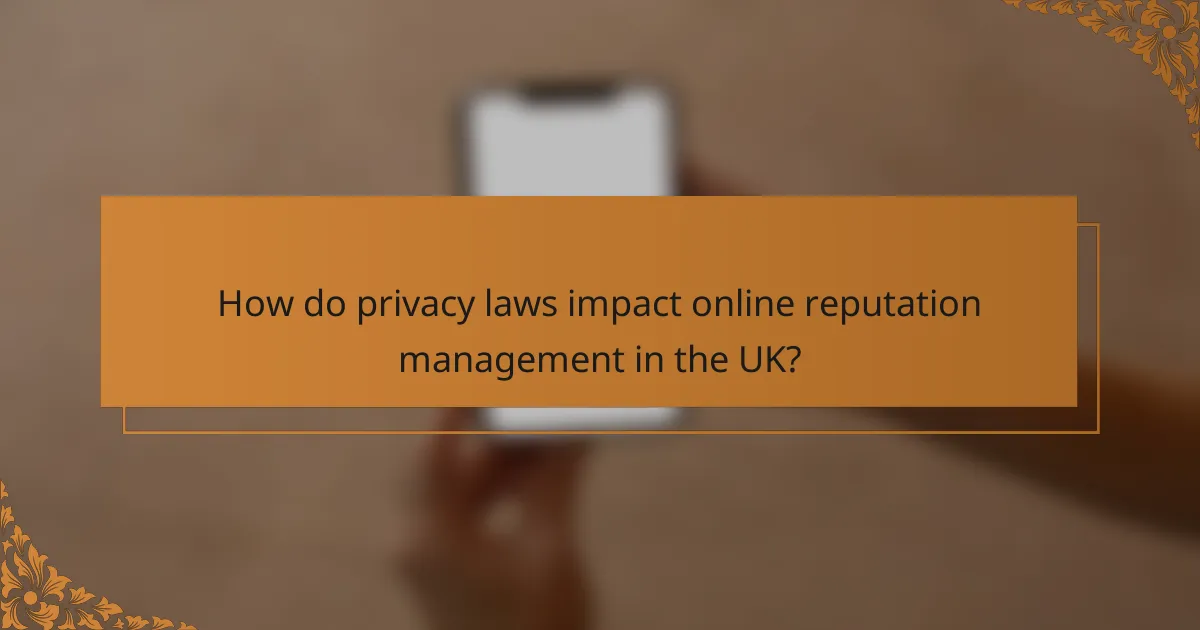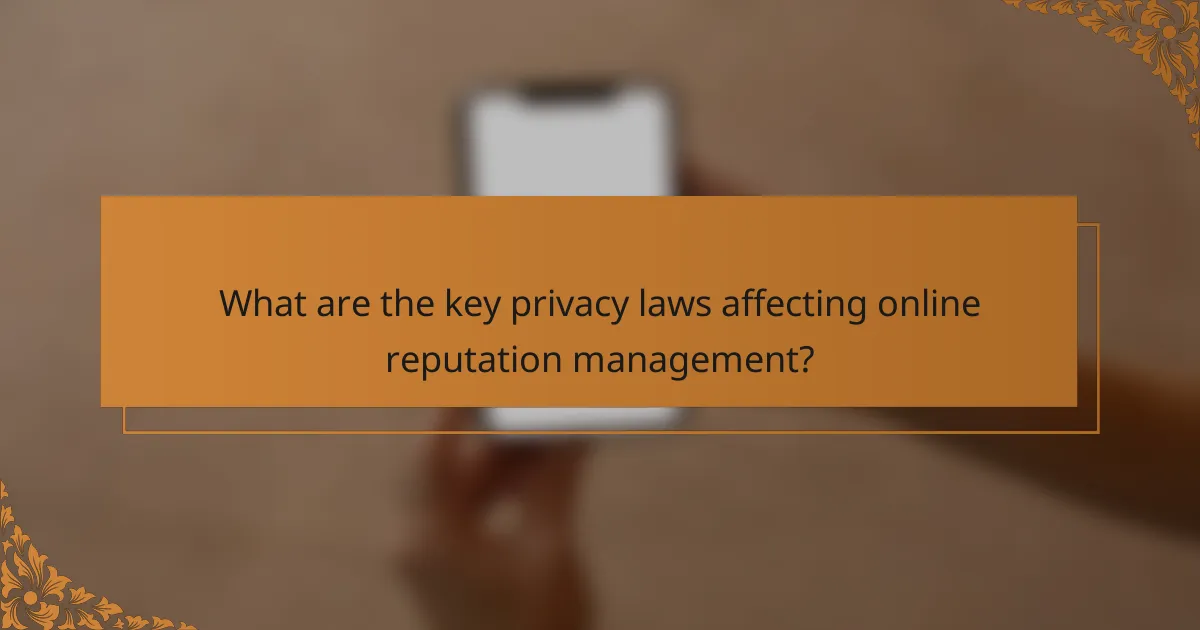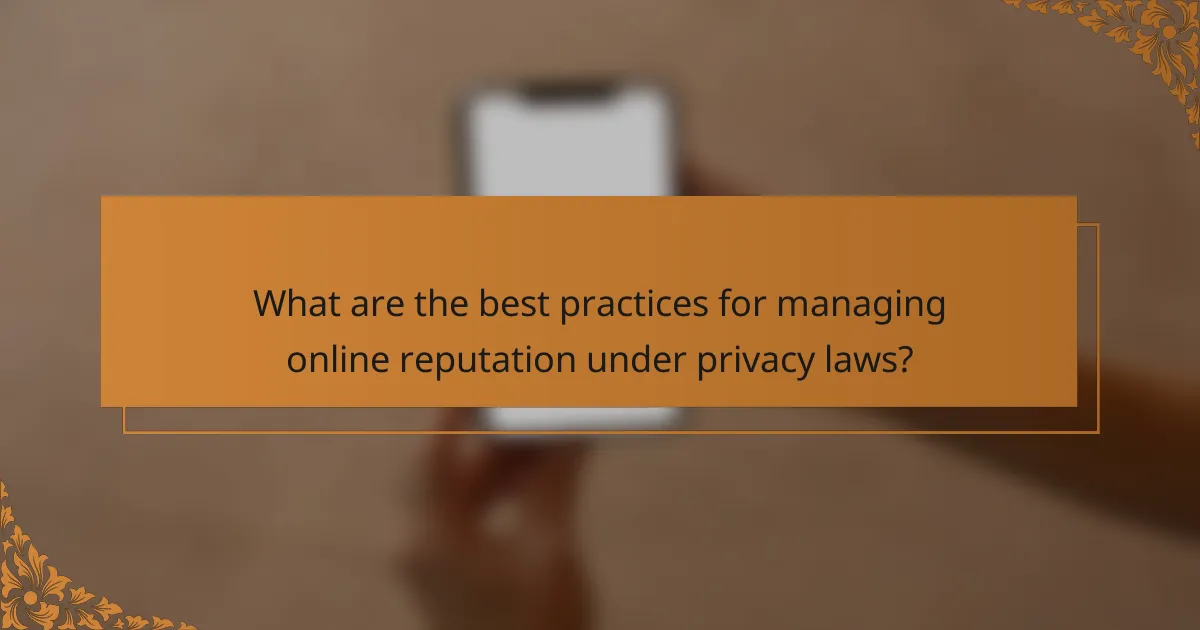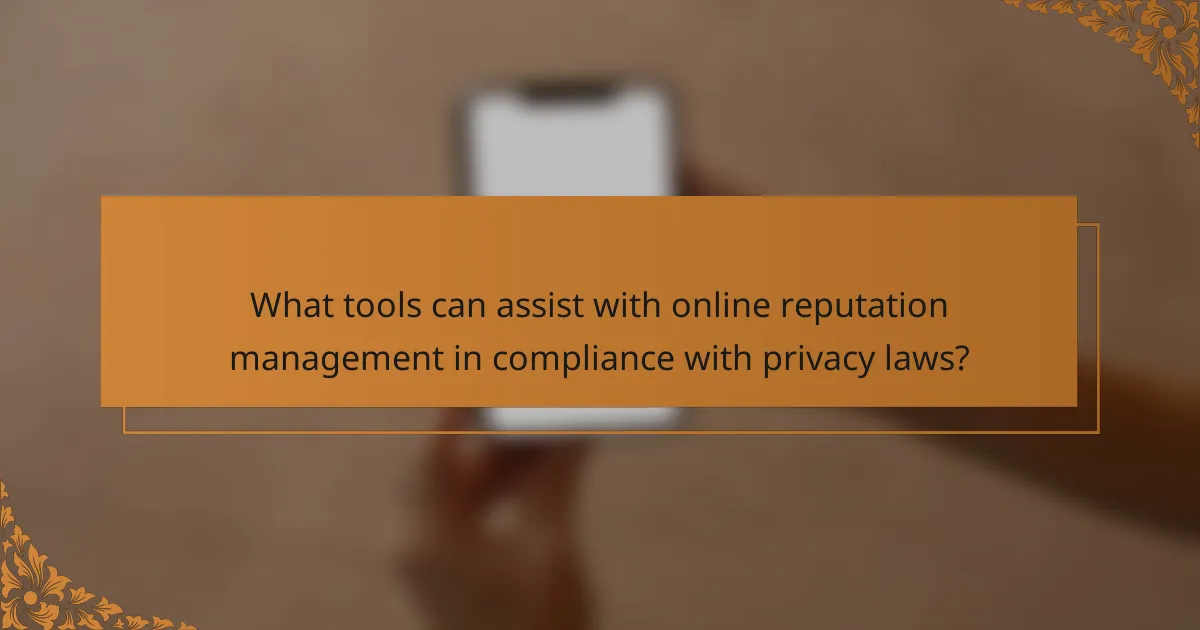Privacy laws play a crucial role in online reputation management by establishing strict guidelines for the collection, storage, and use of personal data. Compliance with these regulations is vital for businesses to protect their reputation and avoid legal issues. Understanding and adhering to these laws enables individuals and organizations to effectively manage their online presence and safeguard customer information.

How do privacy laws impact online reputation management in the UK?
Privacy laws in the UK significantly influence online reputation management by setting strict guidelines on how personal data is collected, stored, and used. Compliance with these laws is essential for businesses to maintain a positive reputation and avoid legal repercussions.
Regulatory compliance requirements
In the UK, the General Data Protection Regulation (GDPR) outlines key compliance requirements for organizations handling personal data. Businesses must ensure they have a lawful basis for processing data, provide clear privacy notices, and allow individuals to exercise their rights regarding their information.
Failure to comply with these regulations can result in substantial fines, which can reach up to 4% of annual global turnover or €20 million, whichever is higher. Therefore, understanding and adhering to these requirements is crucial for effective online reputation management.
Effects on data handling practices
Privacy laws necessitate that companies adopt transparent data handling practices, which can directly affect their online reputation. Organizations must implement robust data protection measures, such as encryption and access controls, to safeguard personal information.
Additionally, businesses should regularly audit their data practices to ensure compliance and address any vulnerabilities. This proactive approach not only helps in meeting legal obligations but also builds consumer confidence in the brand.
Influence on consumer trust
Compliance with privacy laws can significantly enhance consumer trust, as customers are more likely to engage with businesses that demonstrate a commitment to protecting their personal information. Transparency in data handling practices fosters a sense of security among consumers.
Conversely, any breaches or non-compliance can lead to a loss of trust, damaging a company’s reputation. Therefore, maintaining high standards of data protection is essential for cultivating and sustaining consumer loyalty in the digital landscape.

What are the key privacy laws affecting online reputation management?
Key privacy laws that impact online reputation management include regulations that govern how personal data is collected, stored, and processed. Understanding these laws is crucial for individuals and businesses aiming to protect their online presence and manage their reputations effectively.
General Data Protection Regulation (GDPR)
The GDPR is a comprehensive data protection law in the European Union that emphasizes individuals’ rights regarding their personal data. It mandates that organizations obtain explicit consent before processing personal information and grants individuals the right to access, rectify, and erase their data.
For online reputation management, GDPR compliance is essential. Organizations must ensure that any data used for reputation purposes is collected lawfully and that individuals can request the removal of their information, which can significantly affect their online image.
Data Protection Act 2018
The Data Protection Act 2018 complements the GDPR in the UK, providing a framework for data protection and privacy. It outlines specific provisions for handling personal data and includes rights such as the right to be informed and the right to data portability.
When managing online reputations, businesses in the UK must adhere to this act, ensuring transparency in how they handle personal information. Failure to comply can lead to substantial fines and damage to reputation.
Privacy and Electronic Communications Regulations (PECR)
PECR governs how businesses can use electronic communications for marketing and privacy. It requires consent for sending marketing messages and provides guidelines on cookies and tracking technologies.
For effective online reputation management, organizations must respect these regulations by obtaining consent before contacting individuals and being transparent about data collection practices. Non-compliance can lead to reputational harm and legal repercussions.

How can businesses ensure compliance with privacy laws?
Businesses can ensure compliance with privacy laws by implementing robust data protection measures, regularly auditing their practices, and training staff on relevant regulations. These steps help safeguard customer information and maintain a positive online reputation.
Implementing data protection policies
Establishing clear data protection policies is essential for compliance with privacy laws. These policies should outline how personal data is collected, stored, processed, and shared. Businesses should consider adopting frameworks like the General Data Protection Regulation (GDPR) or the California Consumer Privacy Act (CCPA) as guidelines.
Additionally, organizations should regularly review and update their policies to reflect changes in legislation or business practices. This proactive approach minimizes risks and enhances trust with customers.
Conducting regular audits
Regular audits are crucial for assessing compliance with privacy laws and identifying potential vulnerabilities. Businesses should schedule audits at least annually, focusing on data handling practices, security measures, and adherence to established policies.
During audits, companies can evaluate their data processing activities and ensure that they align with legal requirements. Documenting findings and implementing corrective actions promptly can help mitigate risks and improve overall compliance.
Training staff on privacy regulations
Training staff on privacy regulations is vital for fostering a culture of compliance within the organization. Employees should receive regular training sessions that cover relevant laws, company policies, and best practices for handling personal data.
Consider using interactive training modules or workshops to engage employees effectively. Regular assessments can help reinforce learning and ensure that staff members are well-informed about their responsibilities regarding data protection.

What are the best practices for managing online reputation under privacy laws?
To effectively manage online reputation under privacy laws, businesses should focus on proactive monitoring, timely responses to feedback, and transparent customer engagement. These practices help maintain a positive image while complying with regulations that protect consumer data.
Monitoring online presence
Regularly tracking your online presence is crucial for reputation management. Utilize tools like Google Alerts or social media monitoring platforms to stay informed about mentions of your brand across various channels.
Consider setting up automated reports to capture sentiment analysis, which can help identify trends in customer perception. This proactive approach allows you to address potential issues before they escalate.
Responding to negative reviews
Addressing negative reviews promptly can mitigate damage to your reputation. Aim to respond within a few days, acknowledging the customer’s concerns and offering a resolution if possible.
Craft responses that are empathetic and professional, avoiding defensive language. This not only shows that you value customer feedback but also demonstrates your commitment to improving their experience.
Engaging with customers transparently
Transparency in communication fosters trust and can enhance your online reputation. Share updates about your business practices, especially regarding how you handle customer data in compliance with privacy laws.
Encourage open dialogue through social media and other platforms, allowing customers to voice their opinions and ask questions. This engagement can lead to stronger relationships and a more positive public perception.

How can privacy laws shape reputation management strategies?
Privacy laws significantly influence reputation management strategies by dictating how businesses collect, store, and utilize customer data. Compliance with these regulations not only protects consumer rights but also enhances a company’s public image and trustworthiness.
Adapting marketing strategies
Businesses must adapt their marketing strategies to align with privacy laws, such as the General Data Protection Regulation (GDPR) in Europe or the California Consumer Privacy Act (CCPA) in the United States. This may involve obtaining explicit consent before collecting personal data and providing clear options for users to opt-out of data sharing.
For example, companies can implement transparent data usage policies and ensure that their advertising practices respect consumer privacy preferences. This approach not only complies with legal requirements but also fosters customer loyalty.
Enhancing customer data security
Enhancing customer data security is crucial for reputation management in light of privacy laws. Organizations should invest in robust cybersecurity measures to protect sensitive information from breaches and unauthorized access. This includes using encryption, regular security audits, and employee training on data protection protocols.
Moreover, businesses should establish clear data retention policies, ensuring that personal information is only kept as long as necessary. This not only complies with regulations but also reassures customers that their data is handled responsibly.
Building a privacy-centric brand image
Building a privacy-centric brand image can set a company apart in a competitive market. By prioritizing customer privacy and demonstrating a commitment to data protection, businesses can enhance their reputation and attract privacy-conscious consumers.
Strategies include promoting privacy features in marketing materials, engaging in community discussions about data rights, and obtaining certifications that highlight compliance with privacy standards. This proactive stance can lead to increased customer trust and loyalty, ultimately benefiting the brand’s reputation.

What tools can assist with online reputation management in compliance with privacy laws?
Several tools can aid in online reputation management while ensuring compliance with privacy laws. These tools help monitor, manage, and improve an individual or organization’s online presence without violating regulations like GDPR or CCPA.
Monitoring Tools
Monitoring tools track mentions of your name or brand across various online platforms. Services like Google Alerts or Mention can notify you when your name appears in news articles, blogs, or social media. This allows for timely responses to negative content.
When choosing a monitoring tool, consider features such as sentiment analysis and the ability to filter results by source. This can help you focus on the most impactful mentions and prioritize your response efforts.
Content Creation and Management Tools
Content creation tools like Canva or WordPress enable you to produce positive content that can enhance your online reputation. By regularly publishing high-quality articles, videos, or infographics, you can push down negative search results and improve your overall image.
Ensure that any content you create complies with privacy laws by avoiding the use of personal data without consent. This is crucial in maintaining trust and adhering to regulations like GDPR.
Review Management Platforms
Review management platforms such as Trustpilot or Yelp help businesses manage customer feedback effectively. These platforms allow you to respond to reviews, both positive and negative, which can demonstrate your commitment to customer satisfaction.
Encourage satisfied customers to leave positive reviews while addressing negative feedback professionally. This balanced approach can significantly improve your online reputation while staying within legal boundaries.
Social Media Management Tools
Social media management tools like Hootsuite or Buffer facilitate the scheduling and monitoring of posts across various platforms. These tools help maintain a consistent online presence and engage with your audience effectively.
Be mindful of privacy settings and data protection laws when using these tools. Always ensure that your social media interactions respect user privacy and comply with relevant regulations.
